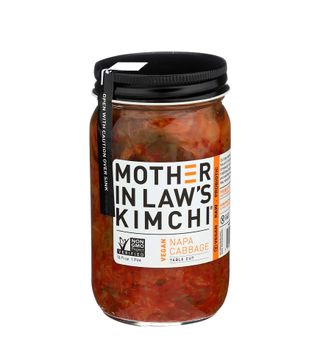6 Foods That Can Negatively Affect Your Mental Health and 19 to Eat Instead

There's that saying that food can be medicine, and it's true to an extent. Of course, food isn't a stand-in for actual medicine or professional health services, but what you eat can really affect how your whole body functions. So if you can change up your diet a bit to make sure you're getting those vitamins, nutrients, and superfoods, you'll be setting yourself up to feel better, and you might even prevent illness.
And food doesn't just affect your physical health. It impacts your mental health, too. Yes, there are certain foods that boost mental health. Internal medicine doctor, author, and senior director of science and clinical innovation at Big Bold Health Austin Perlmutter, MD, says that the foods we choose become the building blocks for our brains and neurotransmitters and may even change the way our brains are wired, all of which can directly affect mental health. "A varied, nutrient-rich diet can help us cognitively, assisting with mental acuity and focus," adds Kim Rose, RDN, CDCES, CNSC, a registered dietitian nutritionist based in Florida. "Research has shown that diets rich in lean meats, plants, and healthy fats may indeed improve overall mental health. This is especially true when it comes to psychiatric disorders related to depression and anxiety."

Eating a diet rich in whole, plant-based foods means that you're providing your brain and body with antioxidants, which are compounds that quench free radicals and reverse or prevent oxidative damage from occurring, says the founder of Rooted Wellness, Sarah Rueven, MS, RDN, CDN.
Plus, there's the whole gut microbiome and good gut health thing to think about. Eating the right foods can ensure your gut health is flourishing, which can help your mental health. "The gut-brain axis (GBA) is a communication system between your gut and your brain, linking your emotional and cognitive centers of the brain with your intestinal function," says Jennifer Maeng, MS, RD, CDN, LD, CNSC, the founder of Chelsea Nutrition and Twinlab's resident registered dietitian. "Serotonin is a chemical that plays a key role in mood regulation, sleep, digestion, wound healing, and libido, and 95% of serotonin is produced in your gut. The production of serotonin in your gut is highly influenced by the makeup of your gut microbiome."

Many people in the United States consume a "Western dietary pattern or habit," which consists of high levels of consumption of sweets, refined grains, processed foods, sugary drinks, and calorie-dense foods that are often void of nutrients. "This pattern of eating has been linked to unchecked inflammation, a process that may increase the risk for depression," Perlmutter says. "Several studies have found that people who eat a Western-pattern diet may be at higher risk for depression. Notably, this is a diet that may be damaging to gut health, which is increasingly being linked to worse mental health."
Other eating habits can also affect your mental health, too. Perlmutter recommends prioritizing a healthy eating plan rather than a quick diet "hack" or crash diet. "Eat meals on a regular schedule and only until minimally satiated," says Ilene S. Ruhoy, MD, Ph.D., a board-certified neurologist, environmental toxicologist, integrative physician, and Gem advisor. "Slow the pace of chewing and swallowing to allow for proper assessment of satiety. Heavy meals or simply too much food for efficient digestion and metabolism can cause slow movement of the gastrointestinal tract and create inflammatory metabolites that can affect how we think, feel, and perceive our world."
Eating to support blood sugar balance can also support your mood, says Ivy Carson, NP-BC, IFMCP, a nurse practitioner at Parsley Health. That can mean eating at regular times and making sure you have enough protein with each meal. "Imbalances in blood sugar levels may be associated with increased anxiety and irritability," she adds. And make sure you're eating a variety of different foods to ensure optimal micronutrient intake. If you mix things up with your menus, you won't get bored, and you'll be excited to eat healthily.
See below for a list of foods that won't do your mental health any favors and foods you want to prioritize.
Foods to Avoid
1. Trans Fats

"Thankfully, by law, trans fats can not exceed more than 2% of oils or fats in processed foods (since January 2022). Our brains require fats to create and maintain healthy cell membranes, but trans fats can cause cell destruction, impacting hormone production and memory and causing inflammation," Maeng says. Look for healthy fats instead like avocados, nuts and seeds, and fatty fish.
2. Alcohol

You'll want to limit your alcohol intake because excessive consumption can have many negative effects on the body, such as severe dehydration, digestive problems, sleeplessness, and headaches. "Alcohol is a depressant that can disrupt the balance of neurotransmitters in your brain and affect how you feel and what you are thinking," says Valerie Agyeman, RD, a dietitian and the host of The Flourish Heights podcast. "When consumed in excess, it may have long-lasting effects that can be detrimental to mental health and can increase the risk for anxiety and depression. On days when looking for an alcohol fix, women should aim for one drink or less and men two drinks or less."
3. Refined Sugar

"Refined sugars are pro-inflammatory in our bodies and alter the composition of the gut microbiome, allowing mucus-degrading bacteria to flourish," Maeng says.
4. Processed Foods

"Neuroinflammation, or inflammation within the brain, is caused by oxidative stress and linked to a higher risk for conditions like anxiety and depression," Rueven says. "Oxidative stress can be caused by a variety of environmental exposures including a diet high in processed foods and added sugars and low in plant-based foods."
5. Caffeine

"Caffeine is often consumed to help boost energy, but it can sometimes lead to heightened levels of anxiety and may disrupt sleep, which is detrimental to brain health," Carson says.
6. Any Food Sensitivities You May Have

"Food sensitivities may also be inflammatory and may be detected with an elimination diet or ideally by partnering with a nutritionist or functional medicine provider for guidance and potential testing," Carson says.
Foods to Eat
1. Dark, Leafy Greens
"Among the many plants linked to better mood, leafy greens like kale and spinach (rich in a variety of vitamins, minerals, and plant nutrients called polyphenols) may be worthy of special attention," Perlmutter says. "In a recent study, people who reported eating more raw spinach and kale noted fewer depressive symptoms and increased life satisfaction. Spinach is also particularly high on the list of plant foods when it comes to antidepressant nutrients."
Dark leafy greens are also a great source of folate, which is a B vitamin that can reduce the levels of homocysteine, a neurotoxin. And magnesium can be found in spinach, bananas, potatoes, avocados, grapefruit, flaxseeds, Brussels sprouts, and swiss chard. "Magnesium is an element that is crucial to our mental health as it can stabilize vessels' delivery of blood to our brain and decrease pain," Ruhoy says. She recommends trying a supplement if you can't get enough of these nutrients through food. Gem's Daily Essentials is a supplement that contains magnesium and more than 15 other nutrients.
2. Fish
"Fatty fish like salmon, sardines, herring, and tuna have been shown to lower symptoms of anxiety and depression," Agyeman says. "Fatty fish are a rich source of omega-3 fatty acids, which work in the brain to interact with mood-related chemicals like dopamine and serotonin. This essential nutrient cannot be made by our bodies. Therefore, we must get it from the food we eat. The American Heart Association recommends eating two three-ounce servings of fatty fish per week. The nutrients that tend to be low in people who are depressed are vitamin D, zinc, and magnesium, all of which are found in fish."
3. Oysters
"In a 2018 paper published in the World Journal of Psychiatry, researchers scored foods based on their levels of antidepressant nutrients. At the top of the list were oysters. Why? Oysters are rich in omega-3 fats, zinc, and vitamin B12, all of which have been linked to antidepressant effects," Perlmutter says.
4. Berries
Carson says berries—and in particular, blueberries—are wonderful for mood balance as they are one of the best fruit or vegetable sources of antioxidants. They contain flavonoids, which may help support mood balance and memory. "And we all feel better when we have less pain and inflammation, and foods with quercetin and bromelain can help, such as blueberries, pineapple, red grapes, dandelion greens, and red apples," Ruhoy adds.
5. Nuts and Seeds
"Omega-3 fatty acids are an essential group of fats your body is not able to produce on its own and are responsible for brain development and cell signaling," Maeng says. "Omega-3 fatty acids have been linked to lower levels of depression in clinical studies." Nuts and seeds such as flaxseeds, chia seeds, and walnuts are good sources of omega-3s in addition to salmon and tuna fish.
Cashews are also a great source of magnesium. "Low levels of magnesium have been linked to higher levels of anxiety, irritability, headaches, and sleeplessness," Agyeman says. "One ounce of cashews has about 82mg of magnesium. Pack cashews as an easy on-the-go snack, or add them to a salad."
6. Fermented Foods
"Fermented foods such as sauerkraut, miso, kimchi, yogurt, and tempeh may also support mood balance by supporting the gut microbiome," Carson says.
7. Eggs
"Whether eaten scrambled, boiled, or fried, eggs also contain tryptophan," Rose says. "Tryptophan is of prime importance because it is a precursor to serotonin. Serotonin is a neurotransmitter that's associated with feelings of happiness, which positively impacts your mood."
8. Prebiotic-Rich Foods
Prebiotic-rich foods are responsible for feeding the good bacteria in your gut, Maeng says. Some examples of these foods include cabbage, garlic, apples, bananas, and oats.
9. Bananas
Ruhoy says bananas also contain dopamine and magnesium, which both support mental health.
10. Broccoli
Broccoli contains tryptophan and healthy fats, so add this one to your list. In general, though, cruciferous vegetables are great for mental health. (this also includes cauliflower and Brussels sprouts.) "These veggies are being actively studied for their health effects, and one reason is that they provide impressive molecules like sulforaphane (Google it!)," Perlmutter says. "When it comes to mental health, a study just published this year indicated that higher consumption of cruciferous vegetables was linked to a lower risk for dying early as well as a lower risk for depression."
11. Lentils
"Lentils are a great source of folate," Rueven says. "Many patients who suffer from depression or anxiety have actually shown to have low folate levels. By increasing your folate intake, you may reduce your risk for depression or anxiety."
12. Edamame
Edamame is another magnesium-rich food that can help boost your mood.
13. Sweet Potatoes
Sweet potatoes will give you optimal amounts of phenylalanine. "Phenylalanine is a precursor to tyrosine, and tyrosine is a precursor to dopamine—all necessary for optimal neurotransmitter balance of these happy molecules, so feed your body what it needs," Ruhoy says.
14. Apples
Ruhoy recommends adding apples and red grapes to your diet since they're rich in quercetin, which can improve inflammation.
15. Cheese
Cheese also contains tryptophan, which we learned is a precursor to serotonin.
16. Holy Basil
"Holy basil is an adaptogenic plant that has been used in Ayurvedic medicine to boost feelings of tranquility," Rose says. "It helps to calm the nerves and unwind from daily stress." She adds that one can of Elements of Balance's Calm has 300mg of clinically effective holy basil.
17. Green Tea
"A warm cup of green tea can bring feelings of calmness and comfort," Agyeman says. "A study found drinking two to three cups of green tea per day has the potential to reduce depression symptoms. Green tea also contains L-theanine, an amino acid that helps fight anxiety."
18. Dark Chocolate
"Everyone likes to hear that reaching for a piece of dark chocolate or two after dinner can actually help improve mood!" Rueven says. "Dark chocolate contains flavonoids, a type of antioxidant that has the potential to suppress neuroinflammation."
19. Yogurt
"Greek yogurt contains probiotics, or live beneficial bacteria that, when ingested, populate the gut," Rueven says. "Dysbiosis, or an imbalance in gut bacteria, is linked to several mental illnesses like anxiety and depression. Consuming probiotics is one way to correct dysbiosis and create a healthy microbiome."
And Greek and regular yogurts are also a great source of vitamin B12, which Maeng says is a cofactor in producing neurotransmitters such as serotonin and dopamine. A deficiency in this vitmain can lead to mood and sleep disorders. You can also find B12 in meat, fish, and eggs, and you can take a supplement, too.
Next, My Mental Health Checklist: 4 Self-Care Strategies That Work for Me
Disclaimer
This article is provided for informational purposes only and is not intended to be used in the place of advice of your physician or other medical professionals. You should always consult with your doctor or healthcare provider first with any health-related questions.
Sarah is lifestyle writer and editor with over 10 years of experience covering health and wellness, interior design, food, beauty, and tech. Born and raised in Los Angeles, she attended New York University and lived in New York for 12 years before returning to L.A. in 2019.
In addition to her work on THE/THIRTY and Who What Wear, she held editor roles at Apartment Therapy, Real Simple, House Beautiful, Elle Decor, and The Bump (sister site of The Knot).
She has a passion for health and wellness, but she especially loves writing about mental health. Her self-care routine consists of five things: a good workout, “me” time on the regular, an intriguing book/podcast/playlist to unwind after a long day, naps, and decorating her home.
-
 This Founder Shares Why We Should Start Celebrating Rest
This Founder Shares Why We Should Start Celebrating RestBurnout is nothing to be proud of.
By Kia Topps
-
 Why Dr. Deepika Chopra Believes that Optimism is Resiliency
Why Dr. Deepika Chopra Believes that Optimism is ResiliencyWhy you should start embracing every feeling.
By Kia Topps
-
 How TikTok's Favorite Photographer Helped Me Find My Confidence
How TikTok's Favorite Photographer Helped Me Find My ConfidenceI renewed my relationship with myself.
By MacKenzie Green
-
 I Only Ate Sakara Life Meals for 30 Days—Here Are 7 Things That Happened
I Only Ate Sakara Life Meals for 30 Days—Here Are 7 Things That HappenedThe brand's 30-Day Fall Reset is finally here.
By Erin Jahns
-
 The 6 Warning Signs You're Not Getting Enough Protein
The 6 Warning Signs You're Not Getting Enough ProteinAnd what to eat to up your intake.
By Sarah Yang
-
 Everything This Professional Ballet Dancer Eats to Fuel Her For Performances
Everything This Professional Ballet Dancer Eats to Fuel Her For PerformancesHer grocery staples include high-quality French butter.
By Candice Aman
-
 These 8 Foods Are the Worst for Rosacea—Here's What to Eat Instead
These 8 Foods Are the Worst for Rosacea—Here's What to Eat InsteadControl those flare-ups.
By Sarah Yang
-
 11 Things to Do If You're Dealing With Anxiety at Work
11 Things to Do If You're Dealing With Anxiety at WorkThese can help.
By Casey Clark






















